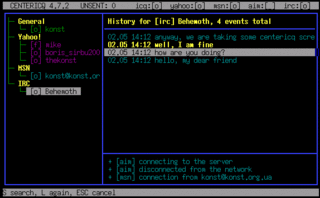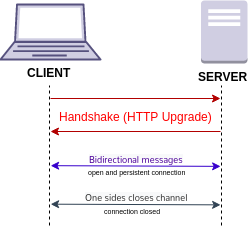
Internet Relay Chat (IRC) is a text-based chat system for instant messaging. IRC is designed for group communication in discussion forums, called channels, but also allows one-on-one communication via private messages as well as chat and data transfer, including file sharing.
ICQ New is a cross-platform instant messaging (IM) and VoIP client. The name ICQ derives from the English phrase "I Seek You". Originally developed by the Israeli company Mirabilis in 1996, the client was bought by AOL in 1998, and then by Mail.Ru Group in 2010.

Instant messaging (IM) technology is a type of online chat allowing real-time text transmission over the Internet or another computer network. Messages are typically transmitted between two or more parties, when each user inputs text and triggers a transmission to the recipient(s), who are all connected on a common network. It differs from email in that conversations over instant messaging happen in real-time. Most modern IM applications use push technology and also add other features such as emojis, file transfer, chatbots, voice over IP, or video chat capabilities.

Extensible Messaging and Presence Protocol is an open communication protocol designed for instant messaging (IM), presence information, and contact list maintenance. Based on XML, it enables the near-real-time exchange of structured data between two or more network entities. Designed to be extensible, the protocol offers a multitude of applications beyond traditional IM in the broader realm of message-oriented middleware, including signalling for VoIP, video, file transfer, gaming and other uses.
Created at MIT as part of Project Athena, Zephyr was designed as an instant messaging protocol and application-suite with a heavy Unix background. Using the "do one thing, do it well" philosophy of Unix, it was made up of several separate programs working together to make a complete messaging system. Zephyr and IRC were the first widely used IP-based instant-messaging systems.
Direct Client-to-Client (DCC) is an IRC-related sub-protocol enabling peers to interconnect using an IRC server for handshaking in order to exchange files or perform non-relayed chats. Once established, a typical DCC session runs independently from the IRC server. Originally designed to be used with ircII it is now supported by many IRC clients. Some peer-to-peer clients on napster-protocol servers also have DCC send/get capability, including TekNap, SunshineUN and Lopster. A variation of the DCC protocol called SDCC, also known as DCC SCHAT supports encrypted connections. An RFC specification on the use of DCC does not exist.

Centericq is a text mode menu- and window-driven instant messaging interface that supports the ICQ, Yahoo!, AIM, MSN, IRC, XMPP, LiveJournal, and Gadu-Gadu protocols.
An IRCd, short for Internet Relay Chat daemon, is server software that implements the IRC protocol, enabling people to talk to each other via the Internet. It is distinct from an IRC bot that connects outbound to an IRC channel.
Client-to-client protocol (CTCP) is a special type of communication between Internet Relay Chat (IRC) clients.

BitlBee is a cross-platform IRC instant messaging gateway, licensed under the terms of the GNU General Public License.
The following is a comparison of instant messaging protocols. It contains basic general information about the protocols.
The following tables compare general and technical information between a number of notable IRC client programs which have been discussed in independent, reliable prior published sources.
A LAN Messenger is an instant messaging program for computers designed for use within a single local area network (LAN).
The following tables compare general and technical information for a number of notable LAN messengers.

QIP is a multiprotocol instant messaging client. It is a closed source freeware program originally developed by Ilgam Zyulkorneev. In 2008 it was bought by RosBusinessConsulting media group and named most popular RBC service in 2009.

WebSocket is a computer communications protocol, providing full-duplex communication channels over a single TCP connection. The WebSocket protocol was standardized by the IETF as RFC 6455 in 2011. The current API specification allowing web applications to use this protocol is known as WebSockets. It is a living standard maintained by the WHATWG and a successor to The WebSocket API from the W3C.

Ayttm is a multi-protocol instant messaging client. It is the heir of the EveryBuddy project.

Quassel IRC, or Quassel, is a graphical, distributed, cross-platform IRC client, introduced in 2008. It is released under the GNU General Public License version 2 and version 3, for GNU and Unix-like operating systems, macOS, and Microsoft Windows. It has also been ported to OS/2 Warp due to its cross-platform nature. Since the release of Kubuntu 9.04 Quassel is Kubuntu's default IRC client. Quassel uses the Qt application framework.
MQTT is a lightweight, publish-subscribe, machine to machine network protocol for message queue/message queuing service. It is designed for connections with remote locations that have devices with resource constraints or limited network bandwidth, such as in the Internet of Things (IoT). It must run over a transport protocol that provides ordered, lossless, bi-directional connections—typically, TCP/IP, but also possibly over QUIC It is an open OASIS standard and an ISO recommendation.

Matrix is an open standard and communication protocol for real-time communication. It aims to make real-time communication work seamlessly between different service providers, in the way that standard Simple Mail Transfer Protocol email currently does for store-and-forward email service, by allowing users with accounts at one communications service provider to communicate with users of a different service provider via online chat, voice over IP, and videotelephony. It therefore serves a similar purpose to protocols like XMPP, but is not based on any existing communication protocol.









